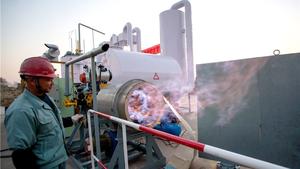 In this undated file photo, a mechanic from Jiangsu Sinopec Superskill Machine Co Ltd, an industrial equipment maker, tests a biogas engine at the company's facility in Yangzhou, Jiangsu province. (YU XING / CHINA NEWS SERVICE)
In this undated file photo, a mechanic from Jiangsu Sinopec Superskill Machine Co Ltd, an industrial equipment maker, tests a biogas engine at the company's facility in Yangzhou, Jiangsu province. (YU XING / CHINA NEWS SERVICE)
Foodscraps, livestock waste and surplus agricultural output-instead of hauling such organic waste to sometimes distant landfills, China is beefing up efforts turn trash into treasure.
Biogas, a mixture of methane and carbon dioxide, which can be produced from decomposing organic waste, is an important clean energy feedstock that can be used for both heat and power. The development of waste-derived biogas is also meaningful in helping reduce reliance on fossil fuels, diversify energy sources and curb carbon emissions, according to experts.
That is part of the reason why China is stepping up efforts in developing the biogas industry. Efforts include providing financial and administrative support to tackle technological barriers and setting up research and development labs in cooperation with institutes and companies.
China has abundant resources of organic waste. Annual production of animal waste and agricultural crop waste can reach 2.2 billion tons and 700 million tons, respectively, which is enough to support the goal outlined by the government.
Zhang Dayong, secretary-general of the China Biomass Energy Industry Promotion Association
The goal is to reach annual biogas output of over 10 billion cubic meters by 2025, and more than 20 billion cu m by 2030, according to guidelines released by the National Development and Reform Commission and other nine ministry-level departments.
Biogas output of over 20 billion cu m per year means a more environmentally friendly treatment and recycling of about 300 million metric tons of crop waste and 200 million tons of animal waste, said Cheng Xu, a professor at China Agricultural University.
According to the National Energy Administration, since 2016, China has seen increasing reliance on imported natural gas with rapid growth of gas consumption. Developing biogas projects helps diversify energy sources and also reduces the use of coal in rural areas.
ALSO READ: Coal-gobbling city preparing to shed black and wear green
Zhang Dayong, secretary-general of the China Biomass Energy Industry Promotion Association, said developing biogas is also beneficial to the ecosystem in agricultural fields as nutrient-rich biogas digestates are generally applied as fertilizers for crops, which is another source of profit for involved companies.
"China has abundant resources of organic waste. Annual production of animal waste and agricultural crop waste can reach 2.2 billion tons and 700 million tons, respectively, which is enough to support the goal outlined by the government," Zhang said.
"However, the industry's development is still hindered by technological barriers, lack of successful business models, high production costs and low profit returns," Zhang added.
The secretary-general said that at present annual production of biogas is around 100 million cu m, adding that China is still at a very early stage in the development of the industry.
According to People's Daily, among the 64 trial biogas projects supported by the government, only about 10 have stable operations and fewer have begun commercial operations.
An official with Derun Biomass Development Co told People's Daily that biogas development still faces challenges like insufficient productivity and low levels of automation.
"Recycling raw materials is also difficult. Many farmers would rather burn surplus crops rather than sell to biogas producers due to high transportation and storage costs," said Lin Boqiang, head of the China Institute for Studies in Energy Policy at Xiamen University.
READ MORE: Plowing work a positive sign in agriculture
More efforts are needed to innovate business models to improve the transportation and storage process, enhance the sales network and encourage the development of ecological farming and organic fertilizers to extend the biogas industry chain, Zhang said.


